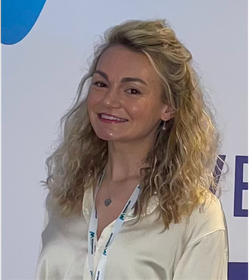Meet Early Career Microbiologist of the Year poster finalist: Philippa Hall

What are your current research interests?
I am interested in understanding and characterising the molecular mechanisms that underpin virus infection, intending to design vaccines and antiviral therapeutics which target these pathways.
My PhD project focuses on enteroviruses (EVs), which include EVA71, the causative agent of hand, foot and mouth disease. I aim to understand how EVs mature into infectious particles, and how these particles then enter host cells and uncoat to initiate infection. Currently, I am utilising a combination of bioinformatic, molecular and structural techniques to help delineate this fascinating pathway and define key residues and critical interactions which control EV capsid uncoating and genome release.
What inspired you to go into this field of work?
We have an amazing virology department at the University of Leeds and taking these lectures during my undergraduate degree inspired me to pursue the study of viruses! The COVID-19 pandemic demonstrated the global importance of the need for improved understanding of virus lifecycles and vaccination approaches. I wanted to be able to understand these fascinating tiny machines, and that’s what led me to pursue fundamental molecular mechanisms of viral uncoating. I am particularly excited by the prospect that this research will allow me to contribute to the current understanding of enterovirus biology.
How would you explain your research to a GCSE student?
I study enteroviruses (EVs). These viruses cause various diseases in humans and animals, which range in severity from common colds to fatal paralysis. EV particles are composed of an icosahedral shell, which contains the viral genome. To initiate an infection, the virus enters the cell and releases the genome into the cytoplasm, this enables the virus to take over the cell and make more copies of itself. Precisely how the genome is released into cells is currently unknown. Therefore, I am working to identify key regions which control this mechanism, with the hope that this information can be used to guide the design of anti-virals which prevent EV infection and potentially save lives!
What do you love most about your job?
I love asking the big questions that are on the cutting edge of what we don’t yet know! I love working on new approaches to answering some of these questions and finding old approaches which can be applied in new ways to help understand what the viruses are doing.
I love the excitement of setting up experiments and the anticipation of finding the result! Even if (and when) the experiments don’t quite work, I always feel so lucky that I can sit down with my colleagues and think of new ways to approach problems! I feel so lucky to work with such a diverse and supportive team.
How do society events, such as the Annual Conference, promote your professional development?
Attending the Microbiology Annual Conference when I was a master's student was a major influence on my decision to undertake a PhD. I was inspired by the collaborative and welcoming atmosphere alongside the amazing science! Returning to the conference as a PhD student with the opportunity to present my research as a poster was a real milestone in my professional development. I particularly enjoyed and appreciated the discussions with my peers, ranging from fellow students to senior scientists from across the world, enabling exciting collaborations. I am looking forward to the possibilities of the Microbiology Society Annual Conference 2025!
You can find and follow Phillipa on Instagram: @pippa_kate20
And on X (formerly known as Twitter): @Stonehouse_Lab
